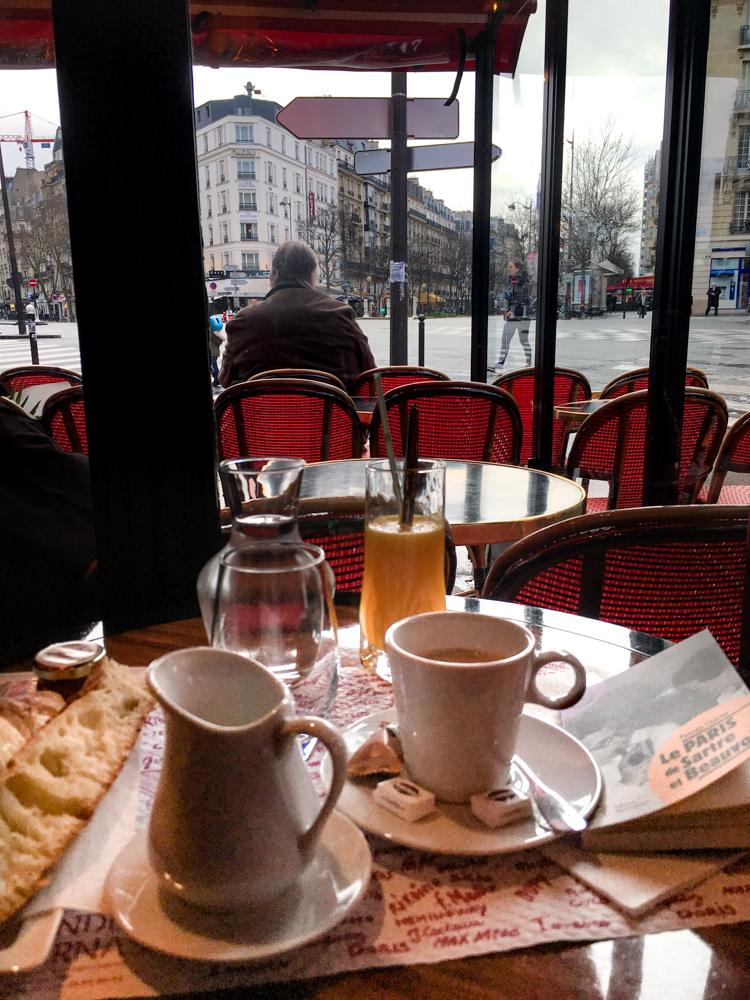Hope

In response to my last post, if you ever need evidence that face-to-face conversation still exists and a pre-iPhone civilization continues elsewhere outside the Bay Area, go literally anywhere in Paris other than the Louvre and soak it all in. Anywhere. Any bar. Any café. Any restaurant. In Paris, it's not merely a generational thing, or a sign of age. I hung out Sunday morning by the Sorbonne with all the college kids, and not one of them was on their phone while drinking coffee. All of them were talking and laughing, socializing. It's simply rude in Paris, I think, to stare at your phone or computer while you're out. Instead, there are folks reading the newspaper, studying books, chatting vivaciously, or simply gazing out at the world like any good flaneur should. Going out in Paris means not having to rush, to think about what's next on the agenda, or map out each hour of your day. You just sit there and talk. Or not talk. Whatever.
If you live in California and thought that world was dead, it isn't. While I did see more yoga pants and joggers on the road than ever before, the French still smoke, drink, eat, and talk as much as they ever did. France has always protected its cultural values that way, which is ironically why Americans love it so much. We're not willing to take any official measures that might impact our freedom here at home, so we simply gush about how romantic it is when tradition continues elsewhere. Look at France's AOC wine appellation system as an example. The reason these winemaking cultures remain intact is because the law states that they must. You cannot make Chardonnay in Sancerre and call it Sancerre. You cannot make Syrah in Bordeaux and call it Bordeaux. Contrast that with Napa or Sonoma where what's made is mostly dictated by the market. Merlot is popular? Let's plant Merlot. Merlot is no longer popular? Let's rip it all out and replant it with Pinot Noir. That's what happened during the last decade because our culture revolves around doing whatever sells, or whatever seems best in the moment. That's not to say there aren't great winemaking traditions in California, because obviously there is a rich heritage here; it's just to say the only real protection for that history is the will of the consumer. Napa Cabernet culture continues because of our continual desire to drink it, that's it. Ultimately, you can plant anything in Napa and call it Napa. You can make Bourbon in Alaska or Alabama, it doesn't matter.
Imagine if America passed a law restricting Bourbon to Kentucky only. It might piss off loads of people (mainly the people trying to capitalize on the current fad), but I'd be in favor of it because frankly I don't drink much California or Arizona Bourbon. I'd support protecting that heritage moving forward, despite that fact that Bourbon has long been made in Pennsylvania and Indiana. In the short term, it seems like restrictive oversight, but in the long term that's how value and tradition are matured, cared for, and preserved. You pick something, you do it better or differently than anyone else, and you stick with it. Then you protect it by preventing others from copying that model and capitalizing on that name elsewhere without the same conditions or standards. For decades and decades, cheap California bulk wine has been marketed as Chablis and Burgundy. When I was in high school we used to buy handles of "Blush Chablis," a sweet rosé à la Carlo Rossi, and drink it out in the orchards. Never once in my life, however, have I seen a French bulk wine trying to market itself as "Napa rouge" or "Blush Sonoma."
When you don't take any measures to protect tradition and culture, you open yourself up to sweeping movements of monumental change. In many cases, that unrestricted potential has been a positive thing for America and it's a longstanding part of what makes our country great. You might say that lack of restriction is indeed our heritage. However, in many other instances, that lack of a firm identity leaves our values vulnerable to the influence of money and the market.
Starbucks at Yosemite, anyone?
-David Driscoll
